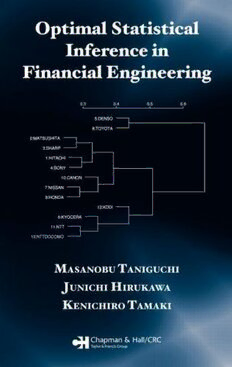Download Optimal Statistical Inference in Financial Engineering PDF Free - Full Version
Download Optimal Statistical Inference in Financial Engineering by Masanobu Taniguchi, Junichi Hirukawa, Kenichiro Tamaki in PDF format completely FREE. No registration required, no payment needed. Get instant access to this valuable resource on PDFdrive.to!
About Optimal Statistical Inference in Financial Engineering
Until now, few systematic studies of optimal statistical inference for stochastic processes had existed in the financial engineering literature, even though this idea is fundamental to the field. Balancing statistical theory with data analysis, Optimal Statistical Inference in Financial Engineering examines how stochastic models can effectively describe actual financial data and illustrates how to properly estimate the proposed models.After explaining the elements of probability and statistical inference for independent observations, the book discusses the testing hypothesis and discriminant analysis for independent observations. It then explores stochastic processes, many famous time series models, their asymptotically optimal inference, and the problem of prediction, followed by a chapter on statistical financial engineering that addresses option pricing theory, the statistical estimation for portfolio coefficients, and value-at-risk (VaR) problems via residual empirical return processes. The final chapters present some models for interest rates and discount bonds, discuss their no-arbitrage pricing theory, investigate problems of credit rating, and illustrate the clustering of stock returns in both the New York and Tokyo Stock Exchanges.Basing results on a modern, unified optimal inference approach for various time series models, this reference underlines the importance of stochastic models in the area of financial engineering.
Detailed Information
| Author: | Masanobu Taniguchi, Junichi Hirukawa, Kenichiro Tamaki |
|---|---|
| Publication Year: | 2007 |
| ISBN: | 9781420011036 |
| Pages: | 379 |
| Language: | English |
| File Size: | 2.728 |
| Format: | |
| Price: | FREE |
Safe & Secure Download - No registration required
Why Choose PDFdrive for Your Free Optimal Statistical Inference in Financial Engineering Download?
- 100% Free: No hidden fees or subscriptions required for one book every day.
- No Registration: Immediate access is available without creating accounts for one book every day.
- Safe and Secure: Clean downloads without malware or viruses
- Multiple Formats: PDF, MOBI, Mpub,... optimized for all devices
- Educational Resource: Supporting knowledge sharing and learning
Frequently Asked Questions
Is it really free to download Optimal Statistical Inference in Financial Engineering PDF?
Yes, on https://PDFdrive.to you can download Optimal Statistical Inference in Financial Engineering by Masanobu Taniguchi, Junichi Hirukawa, Kenichiro Tamaki completely free. We don't require any payment, subscription, or registration to access this PDF file. For 3 books every day.
How can I read Optimal Statistical Inference in Financial Engineering on my mobile device?
After downloading Optimal Statistical Inference in Financial Engineering PDF, you can open it with any PDF reader app on your phone or tablet. We recommend using Adobe Acrobat Reader, Apple Books, or Google Play Books for the best reading experience.
Is this the full version of Optimal Statistical Inference in Financial Engineering?
Yes, this is the complete PDF version of Optimal Statistical Inference in Financial Engineering by Masanobu Taniguchi, Junichi Hirukawa, Kenichiro Tamaki. You will be able to read the entire content as in the printed version without missing any pages.
Is it legal to download Optimal Statistical Inference in Financial Engineering PDF for free?
https://PDFdrive.to provides links to free educational resources available online. We do not store any files on our servers. Please be aware of copyright laws in your country before downloading.
The materials shared are intended for research, educational, and personal use in accordance with fair use principles.

